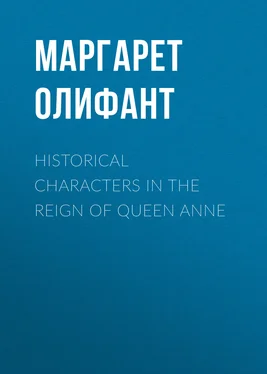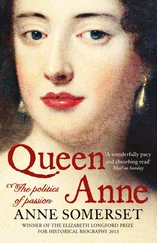Маргарет Олифант - Historical Characters in the Reign of Queen Anne
Здесь есть возможность читать онлайн «Маргарет Олифант - Historical Characters in the Reign of Queen Anne» — ознакомительный отрывок электронной книги совершенно бесплатно, а после прочтения отрывка купить полную версию. В некоторых случаях можно слушать аудио, скачать через торрент в формате fb2 и присутствует краткое содержание. Жанр: foreign_prose, История, foreign_edu, foreign_antique, на английском языке. Описание произведения, (предисловие) а так же отзывы посетителей доступны на портале библиотеки ЛибКат.
- Название:Historical Characters in the Reign of Queen Anne
- Автор:
- Жанр:
- Год:неизвестен
- ISBN:нет данных
- Рейтинг книги:3 / 5. Голосов: 1
-
Избранное:Добавить в избранное
- Отзывы:
-
Ваша оценка:
- 60
- 1
- 2
- 3
- 4
- 5
Historical Characters in the Reign of Queen Anne: краткое содержание, описание и аннотация
Предлагаем к чтению аннотацию, описание, краткое содержание или предисловие (зависит от того, что написал сам автор книги «Historical Characters in the Reign of Queen Anne»). Если вы не нашли необходимую информацию о книге — напишите в комментариях, мы постараемся отыскать её.
Historical Characters in the Reign of Queen Anne — читать онлайн ознакомительный отрывок
Ниже представлен текст книги, разбитый по страницам. Система сохранения места последней прочитанной страницы, позволяет с удобством читать онлайн бесплатно книгу «Historical Characters in the Reign of Queen Anne», без необходимости каждый раз заново искать на чём Вы остановились. Поставьте закладку, и сможете в любой момент перейти на страницу, на которой закончили чтение.
Интервал:
Закладка:
But the king and queen did not see it in this light. “Friends! what friends have you but the king and me?” Queen Mary asked with indignation. It is not to be supposed that she meant any harm to her sister, but with also a sufficiently natural sentiment could not see what Anne’s objection was to dependence upon herself.
The position on both sides is so clearly comprehensible that the strength of party feeling which makes Lord Macaulay defend the somewhat petty attitude of his favorite monarch on the occasion is very extraordinary. It requires no very subtle penetration to see the difference between an allowance that comes from a father and that which depends upon the doubtful friendship of a brother-in-law. Anne had fully proved her capacity to consider the public weal above her own, and it was unworthy of William even to wish to keep in the position of a hanger-on a woman who had so greatly promoted the harmony of his own settlement.
Parliament finally voted her a revenue of fifty thousand pounds a year, as a sort of compromise between the thirty thousand pounds which King William grudged her and the unreasonably large sum which some of her supporters hoped to obtain; but the king and queen never forgave her, and still less her advisers, for what they chose to consider a want of confidence in themselves.
But William was always impatient of the incapable, and the permission was absolutely denied to him. In all these claims and refusals the position of Lady Marlborough as the princess’s right hand had been completely acknowledged by Queen Mary and her husband, who indeed attempted secret negotiations with her on more than one occasion to induce her to moderate Anne’s claims and to persuade her into compliance with their wishes. “She [the queen] sent a great lord to me to desire I would persuade the Princess to keep the Prince from going to sea; and this I was to compass without letting the Princess know it was the Queen’s desire … after this the Queen sent Lord Rochester to me to desire much the same thing. The Prince was not to go to sea, and this not going was to appear his own choice.”
Similar attempts were made in the matter of the allowance. And it is scarcely possible to believe that Mary, a queen who was not without some of the absolutism of the Stuart mind, should have failed to feel a certain exasperation with the bold woman who thus upheld her sister’s little separate court and interest, and was neither to be flattered nor frightened into subservience. And very likely this little separate court was a thorn in the side of the royal pair, keeping constant watch upon all their actions, maintaining a perpetual criticism, no doubt leveling many a jibe at the Dutch retainers, and still more at the Dutch master. Good-natured friends, even in the capacity of courtiers, were no doubt found to whisper in the presence-chamber the witticisms with which Sarah of Marlborough would entertain her mistress—utterances not very brilliant, perhaps, but sharp enough. It would not sweeten the temper of the queen if she found out, for instance, that her great William was known as Caliban in the correspondence of Mrs. Morley and Mrs. Freeman. A hundred petty irritations always come in in such circumstances to increase a breach. What the precise occurrence was which brought about the final explosion is not known, but one day after a stormy scene, in which the queen had in vain demanded from her sister the dismissal of Lady Marlborough, an event occurred which took away everybody’s breath.
This was the sudden dismissal, without reason assigned, at least so far as the public knew, of Lord Marlborough from all his offices. He was lieutenant-general of the army, and he was a gentleman of the king’s bedchamber. Up to this time there had been nothing to find fault with in his conduct. William was too good a soldier himself not to appreciate Marlborough’s military talents, and he had behaved, if not with any enthusiasm for the new order of affairs, with good taste at least in very difficult circumstances. His desertion of James and his powerful presence and influence on the opposite side had contributed much to the bloodless victory of the Prince of Orange; but except so far as this went, Marlborough had shown no hostility to his old master. In the convention he had voted for a regency, and when it became evident that William’s terms must be accepted unconditionally or not at all, he had refrained from voting altogether; so that his support might be considered lukewarm. But, on the other hand, he had served with great distinction abroad, acting with perfect loyalty to his new chief while in command of the English forces. In short, his public aspect up to this time would seem on the face of it to have been irreproachable.
This being the case, his sudden dismissal from court filled his friends with astonishment and dismay. Nobody understood its why or wherefore. “An incident happened which I unwillingly mention,” says Bishop Burnet, “because it cannot be told without some reflection on the memory of the queen, whom I always honored beyond all the persons whom I have ever known.” This regretful preface affords an excellent guarantee of the bishop’s sincerity; but Lord Macaulay omits his statement of the case altogether while quoting passages from the then unpublished manuscript which seemed to support his own views. “The Earl of Nottingham,” Burnet continues, “came to the Earl of Marlborough with a message from the King telling him that he had no more use for his services, and therefore he demanded all his commissions. What drew so sudden and hard a message was not known, for he had been with the King that morning and had parted with him in the ordinary manner. It seemed some letter was intercepted that gave suspicions: it is certain that he thought he was too little considered, and that he had upon many occasions censured the King’s conduct and reflected on the Dutch.” Lord Macaulay, on the other hand, ignoring this statement, assures his readers that the real ground of the dismissal had been communicated to Anne on the previous night (notwithstanding that the great general had been privileged to put on the king’s shirt next morning as if nothing had happened), and that it was in reality the discovery of a plot for James’s restoration, conceived by Marlborough, and in which the princess herself was implicated. It was reported to be Marlborough’s intention to move in the House of Lords an address to William, requesting him to dismiss the foreign servants who surrounded him, and of whom the English were bitterly jealous. Such a scheme of reprisals would have had a certain humor in its summary reversal of the position, and no doubt must Sarah herself have had some hand in its construction, if it ever existed. William was as little likely to give up Bentinck and Keppel as Anne was to sacrifice the friends whom she loved, and a breach between the Parliament and the king would have been, it was hoped, the natural result—to be followed by a coup d’état , in which James might be replaced under stringent conditions upon the throne. The sole evidence for this plot is King James himself, who describes it in his diary. Lord Macaulay adds that it is strongly confirmed by Burnet, but this, we take leave to think, is not the case. At the same time there seems no reason to doubt King James, who adds that the plan was defeated by the indiscreet zeal of some of his own fidèles , who feared that Marlborough, were he once master of the situation, would put Anne on the throne instead of her father.
Whether, however, this supposed proposal was, or was not, the reason of Marlborough’s dismissal, it is clear enough that he had resumed a secret correspondence with the banished king at St.-Germain, whom, not very long before, he had deserted. But so had most of the statesmen who surrounded William, even the admiral in whose hands the English reputation at sea was soon to be placed. The sins of the others were winked at while Maryborough was thus made an example of: perhaps because he was the most dangerous; perhaps because he had involved the princess in his treachery, persuading her to send a letter and make affectionate overtures to her father. Is it possible that it was this very letter which Burnet says was intercepted, inclosed most likely in one from Marlborough more distinct in its offers? Here is Anne’s simple performance, a thing not calculated to do either harm or good:
Читать дальшеИнтервал:
Закладка:
Похожие книги на «Historical Characters in the Reign of Queen Anne»
Представляем Вашему вниманию похожие книги на «Historical Characters in the Reign of Queen Anne» списком для выбора. Мы отобрали схожую по названию и смыслу литературу в надежде предоставить читателям больше вариантов отыскать новые, интересные, ещё непрочитанные произведения.
Обсуждение, отзывы о книге «Historical Characters in the Reign of Queen Anne» и просто собственные мнения читателей. Оставьте ваши комментарии, напишите, что Вы думаете о произведении, его смысле или главных героях. Укажите что конкретно понравилось, а что нет, и почему Вы так считаете.












